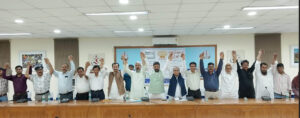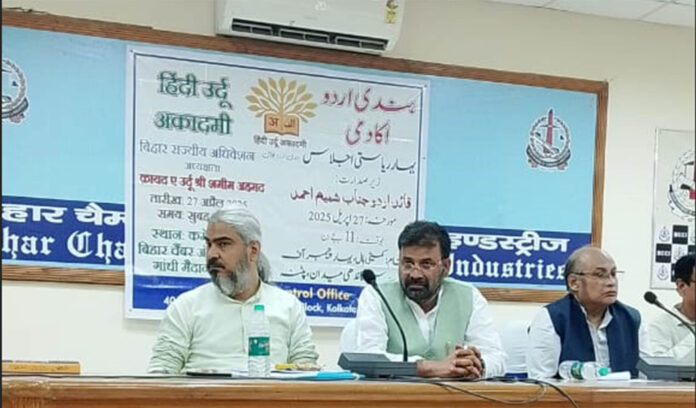Shamim Ahmad: Voice of Urdu, Visionary of India’s Linguistic Legacy
A Portrait of a Cultural Crusader and His Mission to Safeguard Indian Languages
In the vast and multilingual tapestry that defines the Indian subcontinent, very few individuals have risen to become both the voice of tradition and the torchbearer of transformation. Among such rare cultural crusaders stands Shamim Ahmad, an eloquent orator, a committed political leader, a passionate human rights advocate, and above all, a tireless sentinel of Urdu and India’s linguistic heritage.
Hailing from the culturally rich state of Bihar, Shamim Ahmad’s life journey has been shaped by the democratic currents of India’s grassroots politics, the philosophical currents of secularism and pluralism, and the poetic essence of Urdu—his mother tongue, his intellectual homeland, and his enduring commitment. For over two decades, Ahmad has worked not only to uplift marginalized voices in society but also to preserve the voices of the soul—the languages that carry India’s emotional, spiritual and historical memories.
To Shamim Ahmad, Urdu is not just a language—it is an ethical identity, a civilizational bond that unites communities across religious, regional, and cultural divides. In public speeches, parliamentary interventions, and grassroots engagements, he has consistently upheld the idea that “language is memory made audible”, and that Urdu in particular is the audible memory of India’s syncretic civilization—its ghazals, its revolutions, its love letters and its resistance poetry.
His ideological framework stems from the belief that India’s linguistic diversity is not a burden but its greatest cultural asset. Where others see linguistic fragmentation, he sees a federation of dreams, a mosaic of truths, and a garden of coexisting voices. “If Urdu perishes,” he once remarked, “a vital chamber of India’s cultural heart will fall silent.”
The Patna Conference: From Vision to Voice
This lifelong commitment found powerful expression on April 27, 2025, when Shamim Ahmad presided over the State Conference on the Preservation of Indian Languages, held at the Bihar Chamber of Commerce Hall in Patna. The conference was organized by the Hindi-Urdu Academy, a vibrant cultural institution dedicated to nurturing India’s linguistic pluralism and safeguarding the composite heritage of Hindi and Urdu. Under Ahmad’s guidance and vision, the Academy has in recent years evolved into an active force for policy engagement, cultural programming, and public education.

The theme of the conference—“Safeguarding Indian Languages: The Future of Urdu, Hindi, Sanskrit and Other Regional Tongues”—reflected a deep civilizational concern. It brought together a remarkable constellation of academicians, poets, journalists, linguists, and civil society leaders from across the country. But it was Ahmad’s presidential address that became the spiritual centre of the event.
In a thunderous and soul-stirring speech, Shamim Ahmad declared that language is not a medium—it is memory, it is identity, it is resistance, and it is reconciliation. He invoked the shared legacy of Hindi and Urdu as “twin sisters born of the same soil,” who have walked hand-in-hand through the centuries, shaping India’s aesthetic, spiritual, and philosophical landscape.
He warned that languages today face existential threats—not only from neglect, but from the hegemony of globalized media, cultural homogenization, and policy apathy. “If we lose our languages,” he proclaimed, “we lose the map to our own souls.”
Unlike ceremonial conferences that end with polite applause, this gathering, under Ahmad’s guidance, translated dialogue into institutional structure. With the strategic insight of the Academy’s Secretary, Dr. Mohammad Farooq, and under Ahmad’s ideological vision, four Joint Conveners were appointed to lead the linguistic revival mission across Bihar:
- Sayed Afif Siraj – Renowned poet and cultural organizer
- Dr. Mohammad Ehsan – Senior academician from BN Mandal University
- Prof. Dr. Manoj Kumar – Head of Sanskrit, BR Ambedkar University
- Dr. Gyanendra Kumar – Linguist and regional language advocate
This team was entrusted with a monumental responsibility: to activate community-level initiatives, reimagine language education, and push for policy reforms that protect and promote mother tongues in education, media, and public life.
The conference featured fiery and scholarly interventions from distinguished voices such as Dr. Qasim Khurshid, Prof. Dr. Syed Aal Zafar, Dr. Manoj Kumar, Dr. Sushant Kumar, Dr. Abbas Shah, and others. Each reiterated the urgent need to embed linguistic preservation in the national consciousness—not as an optional task but as an existential imperative.
Shamim Ahmad’s service to Urdu is not bound to oratory alone; it is manifest in his long-term involvement in language policy, educational reform, and cultural mobilization. He has consistently emphasized the need to integrate mother tongues into school curricula, organize regional literary festivals, support local writers, and ensure the presence of Indian languages in digital and media platforms. His vision is inclusive—celebrating Urdu, Hindi, Sanskrit, Maithili, Bhojpuri and all regional idioms as branches of one civilizational tree.
At a time when debates on language often descend into chauvinism or political posturing, Ahmad’s approach is both nationalist and pluralist. He sees the defense of linguistic diversity as an act of cultural patriotism, a pledge to India’s plural identity. Through his leadership, a new generation is being inspired to embrace its linguistic roots with pride and purpose.
The Patna conference closed not with perfunctory applause but with a solemn resolution—an oath to preserve the linguistic garden of India in all its fragrance and color. Under the guiding light of Shamim Ahmad, this movement is no longer a solitary effort but a collective awakening. His journey is not merely political—it is civilizational, deeply rooted in memory, poetry, and the ethics of language. And in this journey, Urdu walks not behind him, but beside him—as his companion, his mission, and his legacy.
In the vast and multilingual tapestry that defines the Indian subcontinent, very few individuals have risen to become both the voice of tradition and the torchbearer of transformation. Among such rare cultural crusaders stands Shamim Ahmad, an eloquent orator, a committed political leader, a passionate human rights advocate, and above all, a tireless sentinel of Urdu and India’s linguistic heritage.
Hailing from the culturally rich state of Bihar, Shamim Ahmad’s life journey has been shaped by the democratic currents of India’s grassroots politics, the philosophical foundations of secularism and pluralism, and the poetic essence of Urdu—his mother tongue, his intellectual homeland, and his enduring commitment. For over two decades, Ahmad has worked not only to uplift marginalized voices in society but also to preserve the voices of the soul—the languages that carry India’s emotional, spiritual and historical memories.
To Shamim Ahmad, Urdu is not just a language—it is an ethical identity, a civilizational bond that unites communities across religious, regional, and cultural divides. In public speeches, legislative forums, and literary gatherings, he has consistently upheld the idea that “language is memory made audible”, and that Urdu in particular is the audible memory of India’s syncretic civilization—its ghazals, its revolutions, its lullabies and its resistance poetry.







